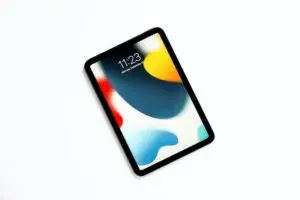Tablet Computers

What Are Tablet Computers and What Are They Used For?
- Lightweight and easy to carry.
- Runs a mobile operating system (OS).
- Touchscreen and stylus.
- Virtual Keyboard.
- Wi-Fi or cellular connection.
- Suitable for reading e-books, and watching.
- movies, sharing photos, and viewing presentations.
Securing Your Tablet Computers: What You Can Do
As mobile devices become increasingly popular, it is important to take steps to ensure that your device is secure. With the right precautions, you can protect your device from malicious attacks and keep your data safe.
- Install reputable antivirus software and keep it up to date.
- Enable a firewall on your tablet.
- Implement strong passwords and change them regularly.
- Set up two-factor authentication when available.
- Disable automatic connections to unknown networks.
- Back up your data.
- Set up a virtual private network (VPN) to use when connecting to public Wi-Fi networks.
Threats to Mobile Devices: How to Protect Your Smartphone and Tablet from Cyber Attacks
- Phishing – a type of cyber attack that uses social engineering techniques to deceive victims into providing sensitive information such as usernames, passwords, and credit card details. Attackers typically use emails, text messages, or malicious websites to lure victims into providing this information.
- Vishing (Voice Phishing): – a type of phishing attack that uses voice calls or automated voice messages to deceive victims into providing sensitive information. Attackers typically use automated voice messages to impersonate a legitimate company or organization and ask victims to provide personal information. Spoofing:
- Spoofing – is a type of cyber attack that involves impersonating a legitimate user or entity in order to gain access to sensitive information or resources. Attackers typically use spoofed emails, text messages, or websites to deceive victims into providing sensitive information.
- Spyware – a type of malicious software that is designed to collect information about a user without their knowledge or consent. Attackers typically use spyware to collect sensitive information such as usernames, passwords, and credit card details.
- Connecting to an unsecured WIFI network can put your device and data at risk. Attackers can use unsecured WIFI networks to gain access to your device and steal sensitive information such as usernames, passwords, and credit card details.
Securing Your Mobile Device: Tips and Tricks
- Don’t download every app you see as apps can disclose sensitive data (call history & contacts).
- Apps can record conversations and disable antimalware.
- Get Apps from trusted stores only, such as Apple iTunes, Google Play, or Amazon, this helps to prevent viruses and malware, which are often distributed via apps.
- Check the App’s privacy policies and understand them before you install the app. Know what info the app wants to get access to such as location or social media information.
- Disable the geotagging feature, you do not need to let others always know where you are at any given time.
- know how to block incoming calls, individual names, and numbers.
- You should avoid connecting your mobile device to any unsecured/unprotected networks.
